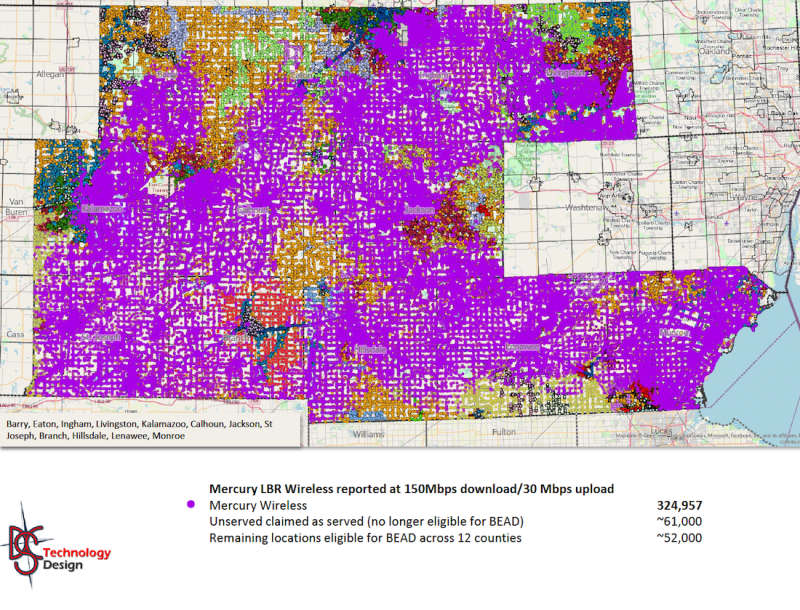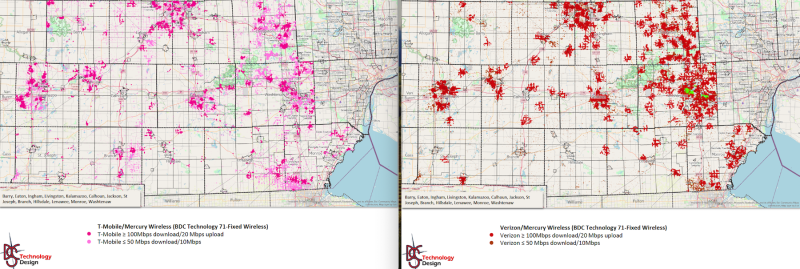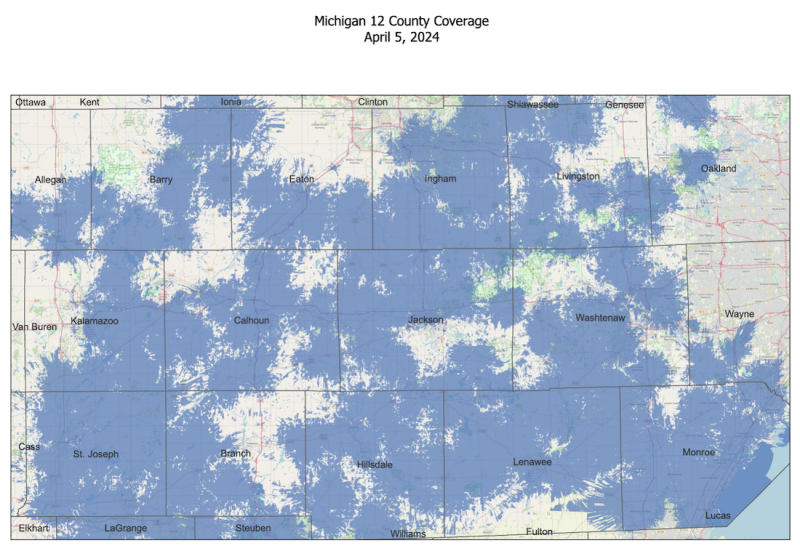-
Mercury Broadband is claiming almost ubiquitous coverage in 12 Michigan counties
-
But when local governments try to find Mercury subscribers, they have a hard time finding any
-
The trade group WISPA stresses that Mercury's reporting on the FCC maps is perfectly legal
4/11/2024 UPDATE: This story was originally published on March 13, 2024. After publication of the story, Mercury Broadband agreed to an interview and the story has been updated with the company’s perspective. (Scroll to bottom)
A broadband consultant claims that Mercury Broadband has overstated its ability to provide fixed wireless access (FWA) in 12 Michigan counties on the FCC’s broadband map. And he says this is deterring other providers from competing for Broadband Equity, Access and Deployment (BEAD) grants.
Chris Scharrer, founder and CEO of DCS Technology Design, reached out to Fierce with mapping data that shows Mercury has claimed it provides practically ubiquitous coverage across 12 counties in Southern Michigan. Scharrer said this is a misrepresentation that is preventing new competitors from entering the counties.
DCS Technology Design works with the counties to provide them with validated data for all served and unserved locations. Scharrer said the FWA coverage Mercury is claiming has reduced the BEAD eligibility in those counties by about 61,000 houses.
This map shows (in purple) the areas in the counties where Mercury claims it provides service.

“ISPs are not interested in pursuing BEAD funding there because it becomes impractical now,” said Scharrer.
It’s impractical because other providers would have to go through a cumbersome challenge process to prove that Mercury doesn’t actually serve broadband at speeds of 100/20 Mbps in every one of the disputed locations.
There’s also a big hurdle in challenging Mercury. If county governments want to submit a challenge, they must find Mercury customers who can attest that they aren’t receiving the necessary speeds. But it’s difficult to find any FWA customers of Mercury in those counties, at all.
Fierce did locate one person who had experience with Mercury's FWA service. Albion Township had tried the service for its own use, and Albion Township Supervisor Ken Blight said in an email, "I'm not interested in bad mouthing them. We tried them, and it didn't work here. That doesn't mean they don't work in other areas."
Fierce also talked with Carol Mattey, a former deputy bureau chief with the FCC who now works as a consultant for ISPs, state governments and trade associations. Mattey said she has no clients in Michigan, but she’s aware of the situation there with Mercury.
She said it is true that the challenge process is difficult for consumers and even more difficult for county governments.
“It is set up so an individual consumer can go on the map and say, ‘I don’t have this service,’” Mattey said. “The kind of information that is required to make a challenge is not something that a local government will have in its possession.”
And she said because a local government would have to challenge each individual location in the FCC system, “it’s impossible.”
She recently filed comments with the FCC on how to improve the map reporting process.
Scharrer also provided maps showing where T-Mobile and Verizon claim to offer FWA service in the same 12 counties. And even though both T-Mobile and Verizon have been garnering FWA subscribers across the country — between the two of them they have more than 7 million FWA subs — their reporting in the 12 Michigan counties is sparse compared to Mercury.

Mercury
Fierce Telecom reached out to Mercury Broadband, also known as Mercury Wireless, for comment. The CEO Garrett Wiseman initially agreed to an interview but then changed his mind.
According to Mercury’s website, the company continues “to accelerate the construction of hybrid fixed wireless and fiber-optic broadband networks to hundreds of thousands of underserved locations across the states of Indiana, Kansas, Michigan, Missouri and Ohio.”
The company is majority owned by the private equity firm Northleaf Capital Partners. “Funds managed by Northleaf will invest up to $230 million over the next several years to support Mercury Broadband’s vision to accelerate high-quality broadband internet services for underserved, rural communities across the Midwestern United States,” stated Northleaf in 2022.
As an aside, there’s also a Rural Digital Opportunity Fund (RDOF) connection to Mercury Broadband. The company won $68 million in the 2020 RDOF auction to bring fiber broadband to the states it serves. After an FCC review of its long form application, and after Mercury defaulted on a couple of locations, the company was awarded about $52 million in RDOF funds. And presumably it's in the process of using those funds to build fiber networks.
Backlash from WISPs
After publication of a story earlier this week about WISPS possibly gaming the FCC maps, there was an outcry from the wireless internet service provider (WISP) community on LinkedIn.
Commenters complained that traditional cable and DSL providers had overstated their speeds and coverage for years, so if some WISPs also did this it was fair as a “defensive” move.
There was a more measured response from Mike Wendy, the communications director with the trade group WISPA. Wendy noted in an email to Fierce Telecom that the FCC considers service to be available at a location if the provider has, or previously had, a connection in service to the location, or if the provider could initiate service through a routine installation within 10 business days of a request with no extraordinary monetary charges or delays.
He also correctly noted that many WISPs can access licensed CBRS spectrum and meet the 10-day availability window.
Wendy wrote, “This isn’t gaming – it’s the law.”
Mattey said, “It is correct that the FCC allows service providers to report their advertised speed, and they’re allowed to report a location where they could make service available within a 10-day interval.”
She said the blame lies with the FCC’s map reporting scheme. But she noted that the scheme goes back a couple of decades to the beginning of broadband data collection. It wasn’t conceived by the current FCC.
The bottom line is that even the most vocal accusers of the WISPs aren’t claiming that they’re doing anything illegal.
They’re simply claiming that FCC map overstatements are going to end up preventing lots of rural folks from getting high speed broadband. And that defeats the whole purpose and goal of BEAD.
4/11/2024 UPDATE:
Mercury Broadband this week provided its own map (see below) of coverage in the 12 Michigan counties in question. Those counties are Barry, Eaton, Ingham, Livingston, Kalamazoo, Calhoun, Jackson, St Joseph, Branch, Hillsdale, Lenawee and Monroe.
The company said it uses Forsk’s Atoll software for its mapping.
“The attached heatmap represents our current coverage as defined by Atoll in the 12 county southern Michigan area,” stated Mercury. “The source data for both our website and BDC [broadband data collection] submissions are the same---Atoll. Of important note, Mercury has dedicated millions of dollars of private capital to build out fiber networks in half of the counties highlighted in the maps (St. Joseph, Monroe, Lenawee, Jackson, Eaton, and Calhoun). St. Joseph County has started construction with the other counties to follow.”

The company also said, “To accurately model radio frequency coverage, precise inputs to our propagation tool (Atoll) are essential.”
Mercury’s RF Engineering team inputs the following attributes of the Radio Access Network into the tool:
- Physical site details including site location, radio mounting height and direction (azimuth) for each radio.
- Transmitter details including radio model, and transmitter power.
- Antenna details including model, gain, propagation pattern, and mechanical and electrical down tilts applied.
- Clutter (foliage, buildings, etc.) and terrain data.
The company stated in an email, “Mercury does not intentionally overstate speeds or coverage. Mercury stands by our coverage reporting.”
Fierce Network asked Mercury for the names and contact information of some of its FWA customers in the 12 counties of Michigan. However, the provider said, “We have discussed the possibility of sharing customer information internally and will not be able to due to privacy and more specifically CPNI [Customer Proprietary Network Information].”